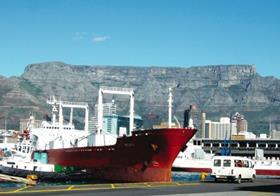
Shipments of South African fruit have returned to normal in Cape Town's container port after strong winds severely disrupted activities last week (Week five).
After a season during which rain has also impacted on production in the early grape regions, shipments are running well behind last year's levels.
One of the vessels delayed at Cape Town by the winds was the MOL Caledon, which was originally due to sail on Monday 31 January but eventually left four days later.
By the end of week four, 22.6m cartons of table grapes had been shipped compared with 28.8m cartons at the same time last season. Shipments to the UK and northern Europe were well behind last year's total, but shipments to the Far East and Middle East increased significantly compared with 2010.
These figures are in line with forecasts that South African growers and exporters are placing much more emphasis on developing markets in the Far East and Middle East than in the past.
'We are delighted that predictions of growth outside the UK and Europe are manifesting itself,' said Elaine Alexander, SATI's executive director.
In South Africa's northern regions and the Orange River, packing has come to an end, with both falling well short of pre-season estimates. The Northern regions shipped 600,000 cartons less than last year, while the Orange River packed 3m cartons less.
Meanwhile, the South African stonefruit crop is expected to increase by some 3 per cent when compared with last season, with plums growing by 9 per cent, while the other categories are all down on last season.
Apricots dropped back further after breaking through 1m cartons two years ago, while nectarine shipments are expected to be 2 per cent down on last season because of a drop in production of the mid- and late-season varieties.
Peaches did not have a good production year, dropping by 17 per cent from last year's 1.1m cartons to below the 2009 export figure.






No comments yet